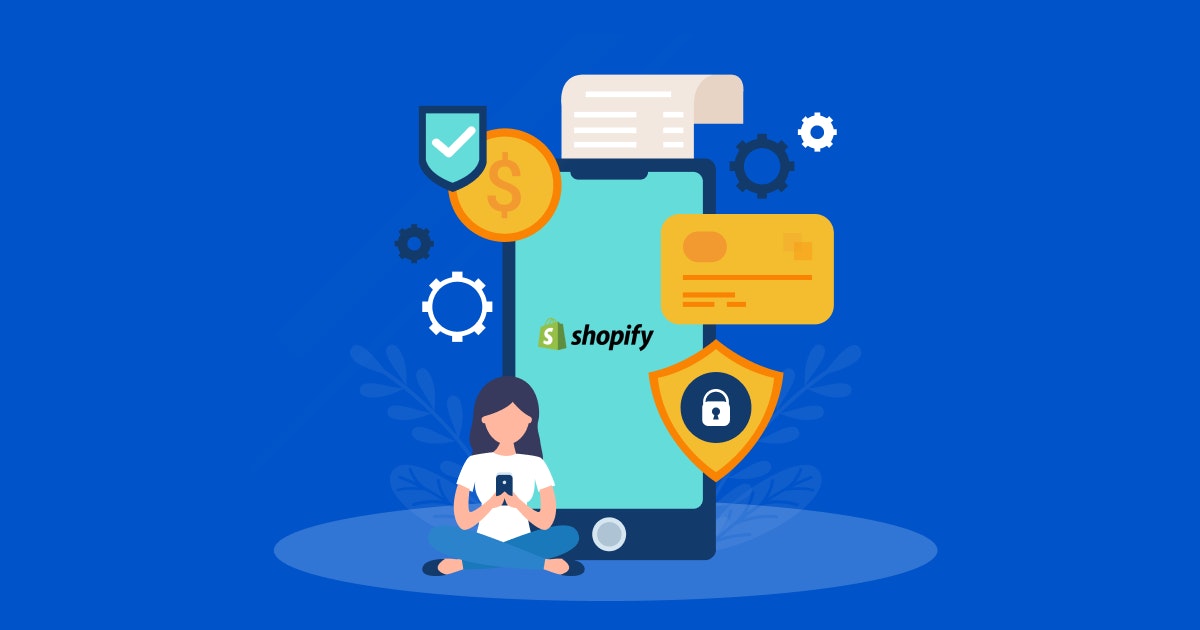Table of Contents
When you purchase a product from a brick-and-mortar store, you either pay for it by your debit/credit card or digital wallet (Google Pay) or simply transact in cash. It is easy. However, when you buy something off online businesses, the option of paying by cash is not available.
And you still have to make the payment before the order gets placed. That is where a payment gateway option makes all the difference. It is a merchant service provided by an eCommerce app service provider authorizing payment processing from many modes for online retailers.
It securely transmits a customer's confidential payment data (credit/debit cards), processes money, analyzes velocity patterns, calculates tax amounts, and undertakes Address Verification System (AVS) checks.
An introduction to Shopify payment gateways
Both online and offline payments are essential to every business as they are one of the ultimate goals of making a sale. Setting smooth payment gateways is, therefore, essential. Your customers must enjoy a remarkable and seamless shopping experience.
Shopify payment gateways enable customers to pay for products or services that they buy from a Shopify eCommerce business.
The eCommerce platform supports a variety of payment methods, including credit and debit cards, net banking, Cash on Delivery, EMIs, wallets, and simple bank transfers. It gives you the freedom to choose the right payment gateway for your customers.
Factors to consider before finalizing a Shopify payment gateway solution
There are many options in the market for you to pick for your Shopify eCommerce business. But taking a call is not as it seems. Not every tool is alike, and you want something that works for your business in the long run. Here are the top five factors to consider before finalizing:
1. Target market
Perhaps the biggest advantage of eCommerce is the opportunity to reach a global audience — regardless of where your business is headquartered. The payment gateway you choose should efficiently serve your target audience.
Shopify has payment solutions that are better suited for specific geographies. For instance, if your business is based in China, but your target market is the US, make sure your chosen payment gateways are popular in the latter.
2. Payment fraud detection capabilities
Research shows there were 49 million victims of identity fraud in the US in 2021. Therefore, make sure the payment gateway you choose is secure, risk-free, and has built-in risk and fraud detection functionality that enables quality transactions. Win the trust of your customers.
3. Transaction fee
Shopify has its payment gateway. However, other third-party payment gateway solutions have varying charges. Some payment processors even charge a monthly amount for their service.
Therefore, you need to be aware of these types of costs that come in the guise of chargebacks, settlement fees, cancellation expenses, and so on. Your eCommerce business will have to incur these, so make sure your payment gateway solution does not affect your profit margins.
4. Acceptable card types
Whatever you select must be able to accept a wide range of globally accepted debit and credit cards, including VISA, American Express, and Mastercard, along with digital wallets and PayPal. If you do not mind giving a Cash on Delivery option, then make sure you can accommodate that on your payment gateway solution.
5. Client testimonials
Even if everything looks good on paper, make sure your payment gateway solution has excellent testimonials to support its brilliance. Check out their homepage or look them up on TrustPilot and peer-to-peer review sites such as G2 to see how well they have fared in the eyes of clients.
You can also read the comments section of their social media pages to see the general sentiment for the payment gateway solution. As a business person, every penny you spend counts. Therefore, get as much information as you can before deciding.
Get your Shopify Website Developed with Intuz
See How12 payment gateways to use for your Shopify storefront
The market may be flooded with many service providers, but because this article has been written with the aim to help you, we narrowed down the list. Check it now; thank us later:
1. Shopify Payments
Shopify Payments is a sleek and innovative payment system that allows you to quickly set up your account without having to worry about transaction fees. Your customers can use it for online as well as physical payments.
It facilitates swift transactions with no additional charges on their end and attractive currency conversion rates. Shopify is an easy-to-use platform that can be activated with a few clicks enabling you to manage your payouts, orders, and payments from the backend itself.
The 2.2% transaction fee is also exempt when using this widely accepted payment gateway. It also offers other benefits such as receiving funds in less than three days and tracking expenses.
Shopify Payments can be set up by simply changing the settings from the 'Payment Providers' page. It simplifies the ordering process for your customers and boosts conversions. Its pricing starts from $29 per month, and it is apt for all kinds of Shopify businesses.
2. PayPal
PayPal is a great payment gateway for Shopify users as it is quick and easy to set up. You can use their free service or get a paid merchant account with more features. PayPal is the best option with an incredible support team when it comes to online payment processing on Shopify.
You can activate PayPal with any Shopify package and avail their service at a transaction fee ranging from 1% to 3%. PayPal's most popular business version is known as PayPal Payments Pro, enabling an eCommerce development company to be professional-grade.
It offers stable functionalities and mobile support, making it the best choice for merchants. It provides them the flexibility to process payments without requiring their buyers to have a PayPal account or be present in person at the time of purchase.
PayPal is a widely used payment platform offering various features that are beneficial for merchants. A wide variety of customization options, easy cart integration, advanced mobile checkout, payments from international customers, along with online invoicing, make payment processing easier.
3. Stripe
Stripe is a popular payment gateway for Shopify merchants, especially those located in the US. It comes with various tools that can be adjusted and customized according to your needs, allowing you the flexibility of accepting credit card payments as well as other international transactions.
It is great for global large firms as it supports over a hundred international currencies. The Stripe payment gateway is a great way to keep your Shopify business running costs low and provide you with an easy environment for tracking sales.
The solution can be implemented seamlessly into any Shopify store using their free extension. Their payment processing fee is charged at a flat rate, but you can opt for a custom plan based on your transaction volume — consult them.
Besides accepting standard transactions, Stripe allows you to accept payments from options like Apple Pay and Google pay. It also offers features like one-click checkout and mobile payments. The only thing is its service is limited to specific geographies. So, double-check that.
Is Building An Ecommerce Website A Costly Affair?
Read Now4. 2CheckOut
2Checkout is a Shopify payment gateway that allows you to accept online credit card transactions from customers in your home country and over 87 countries around the world. It is a less popular option used in combination with other payment solutions.
2CheckOut is now known as 'Verifone,' offering you a unique modular payment solution model. It is one of the easiest ways to get started with an online storefront. It provides a host of features, including professional onboarding services.
Their design lets you choose from their 45 payment-related features matching your business needs. It helps you save extra costs or any fees attached to features you do not wish to use. You can access subscription billing for repeat purchases.
2Checkout ensures your taxes and risk management is taken care of. Their risk and compliance section will keep track of potential privacy issues or fraud. The platform tracks all transactions and fees to make the global tax calculation process hassle-free.
5. Authorize.net
Authroize.net might be the perfect option for Shopify users looking for payment processing and management services. They offer a wide range of payment options and services tailored specifically to meet all kinds of needs, from small businesses to large corporations.
Authorize.net allows users online checkout without any hassle, along with an affordable credit card and eCheck processing system. Embedding Authorize.net payment solution with your business' mobile application allows your customers to make purchases through your app.
The gateway can be easily integrated into your Shopify store for accepting electronic and credit card payments in person, online, or over other digital payment services like Apple Pay, Visa Checkout, and PayPal.
Authorize.net is equipped with features for an end-to-end e-checkout, such as customer profiling and tokenization. Once deployed, the solution offers fraud protections through rule-based filters and easy-to-use billing tools for managing your recurring payments.
6. WorldPay
WorldPay from FIS is a trusted payment platform that offers many benefits to businesses on the Shopify platform. It is user-friendly and reliable with features such as security. It supports payments for businesses of any size or type.
The platform operates efficiently across 120 countries, allowing businesses to transact in different currencies across the globe.
WorldPay is among the popular online payment gateways for Shopify as it offers a low fee structure that can be tailored to your business' needs and reliable uptime. The transaction fee for WorldPay depends upon the turnover of your store.
It automatically runs all payments through a Risk Management Mechanism (RMM) to prevent fraudulent transactions. WorldPay is a complete online payments service that enables you to take payments directly from your website or app.
The platform lets you track your sales and customer preferences in real-time. It also releases payments twice a week to make it easier for business owners.
Top 10 Ecommerce Analytics Tools You Should Know About
Learn More7. Opayo
Opayo, earlier known as Sage Pay, is a popular payment option throughout regions in the US and UK. Designed to work with Shopify and similar eCommerce platforms, it works as effectively offline as it does online.
The platform takes an innovative approach by offering monthly fees for set numbers of transactions instead of charging per transaction like other eCommerce payment solutions.
The platform offers security and reliability when handling transactions through its high level of customer authentication. Opayo is a reliable system with access to online payment, phone orders, POS terminals, and card terminals.
A function that makes it stand out from other systems in its class is the plethora of ways customers can pay through Opayo. It even accepts payments through PayPal.
Opayo is a robust customer authentication solution available at an affordable price, starting at £25. It is ideal for small businesses or even individual business owners.
8. Amazon Pay
Amazon Pay is among the best payment gateways for Shopify, offering one-click checkout. It is quick to set up and easy for your customers to use. Customers can also checkout using their Amazon accounts on your platform.
Allowing this functionality makes the checkout process quicker as user and business details are automatically captured from their Amazon account. Amazon Pay can integrate directly with your Shopify eCommerce platform and offer a seamless checkout experience for your customers.
It allows you to accept payments through various mobile and online payment options, including Alexa Voice Payments and digital wallets. The platform processes your payments daily, and you receive the funds in your bank within three to five days.
The platform offers dedicated customer support to business owners and guidance to new users. You can even provide your customers to make payments through EMIs on Amazon Pay or offer targeted rewards to repeat customers.
9. Skrill
Skrill is an eCommerce payment platform renowned for its quality services in Europe. Beyond the region, Skrill is also being used in over 40 countries. It offers Shopify business owners the option of a frictionless payment transfer.
The platform emphasizes providing a safe and secure gateway that supports quicker transactions. The popularity of Skrill can be attributed to the seamless payment processing for customers and receiving for businesses.
The platform is also popular among digital wallet users and allows you to connect with existing Skrill users as well. The platform offers chargeback protection to protect you from losses. It is highly affordable as the transaction fee is as low as 1.9%.
Skrill is easy to integrate with your Shopify store to offer a seamless checkout to your customers. You can obtain their API upon signing a contract with you. The platform also offers enough technical support in the form of detailed guides and other technical assistance.
10. Alipay Global
Alipay Global is a popular payment gateway launched in China and is now being used across the globe. The platform has made digital payments accessible for all by partnering with Shopify.
It is among the best payment gateways for Shopify as it allows you to offer your customers a user-friendly checkout experience. You can accept payments through credit cards, e-wallets, and other methods preferred by your consumers.
Alipay Global is easy to integrate with your online store. The platform has efficient features to keep your data safe, such as advanced encryption and real-time risk monitoring. It also monitors all payments to eliminate instances of fraud and avoid money laundering.
Upon integrating Alipay Global to your Shopify store, you can give your customers the options to pay directly through their preferred e-wallet or authorize the gateway to collect payments automatically from their specified account.
It helps you reach out to cross-border consumers and build a new audience for your eCommerce business.
11. PayFast
PayFast is an innovative payment solution for your Shopify store. Their payment solutions are tailored to meet your store's needs and requirements. The South Africa-based platform is renowned for its customization and integration capabilities.
PayFast offers a merchant refund feature; the offering allows you to control and manage refunds to your customers. The platform also offers an e-wallet known as PayFast wallet to store your money safely. You get access to the payments dashboard on their app and online.
PayFast offers reconciliation reports to make it easy for you to track the finances of your Shopify store. You can choose to generate the reports daily, weekly, or monthly. These reports can be downloaded in CSV format and shared with your team over email.
Similarly, you can opt to receive email notifications for all successful transactions. PayFast charges an all-in fee every time you accept a payment successfully. It is one of the very flexible tools out in the market.
12. PayGate
Another South African company, PayGate payment gateway, is the most up-to-date payment solution for Shopify store owners. Their online credit card processing system is robust and performs in all 'card-not-present' situations.
PayGate offers a multilingual and multi-currency payment solution with seamless processing and settlement capabilities. The platform processes payments in online, offline, and demand payment modes. It also has many back-office features suitable for business owners of all scales.
PayGate's secure and convenient website payment option is encrypted before being transmitted. In addition to this safety measure for customers, the platform offers privacy from external hackers or vendors.
You get easy access to crucial data such as customer records and sales figures on the system. Their base fee is as low as 0.25%.
Why do merchants opt for the third-party route for payment gateways?
Incorporating a third-party payment gateway costs a fraction of what it takes to set up a merchant account. But that is not the only benefit you get by partnering with them. Here are X benefits to watch out for:
1. Disputes and refunds management
They are a part of everyday life, but how you handle them ultimately drives the happiness of your customers. A third-party vendor handles all monetary transactions on your behalf. They can also efficiently address customer grievances in the shortest turnaround time.
2. Risk mitigation
Online transactions always carry an element of risk. Since a third-party payment processor handles high transactional volumes every day, it can easily detect potentially risky transactions. Flagging and declining fraudulent activities will help you keep financial losses at bay. Who does not want that?
3. Turnaround time
An eCommerce storefront is open for business as soon as it is live. You cannot afford not to have a payment gateway solution in place if you want to start driving sales as soon as you can. However, setting up a merchant account can be lengthy and complex.
Besides, if a vendor finds your business risky, they may even reject your application. In that respect, third-party payment providers ensure a smooth and quick setup. Their responsibility is to ensure your infrastructure is in place at the earliest. Also, check their setup fees.
4. Reliability
Everyone likes to partner with businesses that they can rely on. You are no exception. Provide digital proof of you working with a third-party vendor by adding their logo to your website. When your customer sees the name of their trusted payment partner listed on your store, they will trust you more and, of course, be more inclined towards buying from you.
5. Compliance
Opting for the third-party route means you do not have to worry about the safety of your transactions. That is because the payment processor takes necessary precautions to keep your customer data safe and keeps all kinds of fraudulent activities at bay.
Over to you
With a range of options to choose from, you know the homework has been done. All you need to do is pick a suitable solution and integrate it with your Shopify store that makes sense for your customers. Consider what you are selling and who your target audience is.





